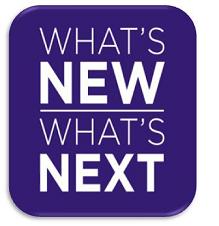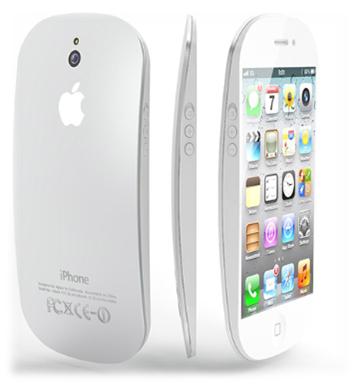My email box is always full with all sorts of exciting stories about new gadgets and technologies. Here’s yet another mock-up of the alleged iPhone5:
Is it real? Who knows? Who cares? I want one.
Same with the iPad 3. What features will it contain? Will original buyers of iPad decide that now’s the time to upgrade?
All of this new, now, gotta have it buzz says a lot about who we are and how fast we’re moving. Maybe it’s our shortened attention spans. Maybe it’s because we realize the possibilities are infinite, so we want it now.
Which brings us to radio. A medium that hangs in there largely because of habit, convenience, and history. The elements that have kept radio vital all along were put in place by the programmers, managers, and owners who are long retired or who have moved on to other industries. Back then, PDs were celebrated – not because they could program three stations in a cluster, voicetrack an airshift, and oversee small clusters of stations in another state. But because they brought innovation, excitement, and bigness to their brands.
Radio’s challenge in remaining relevant today has nothing to do with Pandora, iPods, or YouTube. It has nothing to do with hoarding Facebook “likes” or making sure the midday jocks writes a blog.
It has everything to do with hearing the same hackneyed programming day in and day out. And year in and year out.
Maybe you can win in PPM by being consistent and making sure your stopsets fall in bow tie formation every hour or by ensuring that you never play a song that doesn’t test above a 66.
 But in the larger game of entertainment, these “isms,” rules, and fear of change are the stuff that contributes to perceptions that radio doesn’t care, isn’t engaged, and doesn’t get it.
But in the larger game of entertainment, these “isms,” rules, and fear of change are the stuff that contributes to perceptions that radio doesn’t care, isn’t engaged, and doesn’t get it.
It is about innovation – creating new things around your brand, adding new team members to your morning show, looking for ways you can curate new music/artists and how the audience can discover it, inventing smarter uses of Facebook that make people feel acknowledged, finding ways to integrate video streaming, installing that webcam in the studio, and building an app that provides value and entertainment your audience cannot get from your cluttered website.
Not everything new is going to work – on that you can be sure.
But new “gadgets” for your programming, your weekends, your morning show, and yes, even your sales staff will generate buzz, chatter, and other thoughts that can be the kindling that energizes your station – and your audience.
The push needs to come from the top. That’s where it starts at Nike, Starbucks, Google, Groupon, and Ford. If CEOs are not pushing for innovation and challenging their employee base, the chances of spontaneously combusting great ideas are next to none.
When I worked for Frank Magid many years ago, his company was immensely successful. And yet, every few months, we were all dragged into the conference room to work on new questions, new research techniques, new products, and new initiatives with new acronyms. Frank realized all too well that cranking out the same research studies using the same questionnaires was a non-starter. Innovation was something he could sell.
That same type of thinking can re-energize radio.
When did standing pat become a strategy?
We have to sound different.
This year’s model needs to be better than last year’s.
We have to give our audiences something to talk and care about.
Different, new, and innovative are good.
This should be part of everyone’s quarterly goals.
- A 2020 Lesson?It Could All Be Gone In A Flash - April 24, 2025
- How AI Can Give Radio Personalities More…PERSONALITY - April 23, 2025
- Can Radio Afford To Miss The Short Videos Boat? - April 22, 2025





Hmmmm…. that ‘iPhone5’ looks suspiciously like an Apple Wireless Mouse
(see picture – https://goo.gl/O83WO).
However, the point:
Apple’s passion for innovation has long-since spawned another Apple spin-off industry; the thousands of people who spend their day feverishly Photoshopping Apple prototype visions based on rumour-mill specs, while anticipating, awaiting, and trying to predict:
(a) What the new iteration of any given Apple product will look like,
(b) When it be announced,
(c) When it will become available,
(d) What it will do,
(e) How much it will cost,
(f) Exactly when a beta version will be mistakenly left in a Silicon Valley sports bar by an Apple employee (to be inevitably found by a writer for a tech blog), and
(g) Will it come in white.
Yes, and if I programmed, managed or owned a radio station, I’d LOVE for listeners to speculate about my brand, what will change, and what I may do next. This is why there are consistently lines outside of Apple stores. Thanks, Ralph.
I think radio has been uber-focused on innovation, but not Apple’s type. Rather than being focused on how to change the product and make it more attractive, it’s been focused on how to deliver the same product for less money. More like if Apple came out with the first iPad and tried to make it cheaply enough that they could sell it for $200 – or the original iPhone for $50, rather than make it better and sell it for the original price.
What if you could take a fully tracked/syndicated station programmed remotely by some format captain from 1000 miles away, go back in time and play it for a PD or listener focus group in 1995? My guess is that they would all be pretty impressed. Radio stations sound pretty much the same as they did in 1995, but they are able to do it for far less money. That’s where the innovation has been focused and implemented.
The problem is that most of radio’s competitors for listener time are focused almost fully on innovation – with some, like Pandora content to lose money in the near term. At some point, radio will have to meet the Apple strategy half way and augment its focus on operational efficiencies with real, consumer focused innovation. Radio’s chief advantages right now are ease of access, habit and years of good will toward a product that most people like a lot. But its competitors are closing the access gap and once that happens, the bar for media relevance will be much higher.
Since consolidation began in earnest, radio has focused on a number, and then figured out how to get there. Innovation can work the same way, but you have to focus on a product outcome, and then figure out how to pay for and monetize it.
What if Jerry Lee owned Clear Channel? “WWJD – What Would Jerry Do?” might be a good place to start.
Great points, Bob. And I guess I never viewed innovation as how to do the same for less. But you are correct that radio is far down that path, and in fact, I sit in on many meetings where we spend more time considering what we can live without than truly innovating. It’s a terrible box when startups can lose money – and we’re talking satellite radio, Pandora, and Groupon – while radio’s performance continues to be measured on old school margins and EBITDA. As for the WWJD, he wouldn’t consolidate and he would always consider his customers in every equation – listeners, advertisers, and his community. Thanks again for keeping the conversation going.
“When did standing pat become a strategy?” … Well put Fred ! As one of those PD’s who has moved on to other industries (for that very reason, among others), I could not agree more. It seems more & more obvious that ‘playing it safe’ is becoming increasingly hazardous to radio’s future. Speaking now from the perspective of a listener & observer, no longer involved in the day-to-day, I still love radio, but I believe it can be so much better (& so much more competitive with newer media choices)… Agreed, not every new idea will work, but PLEASE, allow radio people get back to what they have done so well; being creative by letting programmers and air-talent at least TRY something new, different & interesting for listeners.
Thanks, Greg. Maybe when we had it all to ourselves, risk was, well….risky. But given the givens of today’s media and entertianment culture, we have to move. Thanks for the outside-in perspective.
“When did standing pat become a strategy?”
I had a boss when I did a brief (12 year) stint in restaurant management between radio gigs who always told me, “If you’re not moving forward, you are moving backward by default. There is no standing still”
Best advice I’ve ever received.
Sean, thanks for sharing. Simple, but says it.